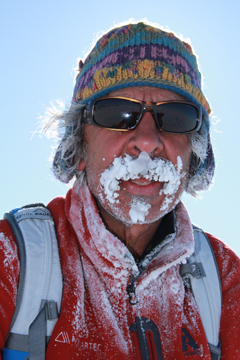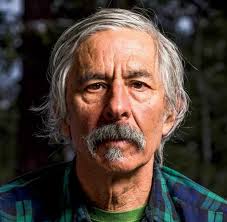#71 Put down your smartphone
January 12th, 2017
REVIEW: Jon Turk’s Crocodiles and Ice (Oolichan 2016)
By Jeremy Twigg
If you’ve ever wondered how to survive a crocodile attack, Jon Turk’s Crocodiles and Ice (Oolichan $23.95) is for you.
As described in the recounting of his solo kayak trip in the Solomon Islands, the trick is simple: determine whether you’re right-side-up or upside-down in the reptile’s jaws, and poke it in the eye.
That’s lesson one in this non-fiction odyssey that spans the themes of nature, religion, counter-culture, imperialism and global warming.
Dividing his time between Fernie, B.C. and Darby, Montana, Jon Turk has earned National Geographic’s Adventurer of the Year status. The central portion of his memoir, Trial by Ice , chronicles his successful circumnavigation of Ellesmere Island in the North Pole, a world-first feat Turk accomplished at the ripe old age of 64.
That grueling Arctic expedition includes close encounters with wolves, polar bears and walruses (the latter are known to attack kayakers), and starts out rather pathetically… with Turk repeatedly falling down because he’d attached the climbing skins of his skis on backwards.
Turk’s polar adventure describes his awareness of global warming’s wide-reaching effects—illuminating this book’s overall message that human disassociation with nature is putting the survival of our species at risk.
Educated as a scientist, Turk accepts the benefits of modern technology and medicine, and argues that anyone who advocates ‘turning the clock back’ on these advancements belongs on the ‘dismissible delusional fringe.’ But he warns that a sustainable 21st Century won’t be possible if we continue to communicate solely with machines, shopping malls and electronic devices.
As a metaphor to reinforce his warning, Turk points out that no modern human could build an ocean-going canoe with stone tools, and sail across oceans to distant islands, “because our thoughts and behaviour patterns are too rooted in technology and too distant from the subtle, intangible, and inexplicable secrets of nature.”
To help us begin this shift in consciousness, Turk grants us the position of armchair voyeur so we can comfortably experience both the euphoric highs and requisite discomforts of outdoor adventure. He weaves lessons of history and science through each chapter. As the author of North America’s first environmental science textbook, he has the credentials to do so.

En route to the Dalai Lama’s birthplace.
While the chapter Bike Ride to the Dalai Lama’s Birthplace informs the reader about China’s past and ongoing imperialism – a subject about which many people know precious little – the reader might miss some of the survivalist intensity of Turk’s North Pole conquest and the exotic imagery of the crocodile encounter. But I was surprised to find myself soaking up this information.
Turk is a rebel, and his big personality plays a big role in his story-telling. As a young lad hitch-hiking his way through the Middle East in the 1960s, he can’t hold his tongue when he overhears an Arab guide addressing a group of Christian pilgrims in East Jerusalem. “And what about the Jews?” he asks the guide. “Didn’t they have a historical presence in this city?”
For his brashness, Turk is surrounded by guards armed with AK-47 assault rifles, taken to a room with no windows, and roughed up. When he’s being accosted, he describes feeling a sense of ‘deep calm’ that he attributes to surviving subsequent life-threatening situations in the wild.
When he was the manager of a struggling rock band in 1966, Turk’s grades suffered during the heady days of the Grateful Dead and free love. He’s a poet when he wants to be, as evidenced in his description of a run-in with the Dean of Housing at college:
Didn’t he know that there was no confusion about smoking pot and dancing all night with my girlfriend, or lying flat on the gas tank of a stripped-down, souped up crotch-rocket, legs spread out behind like the tail feathers of a hawk, throttle full bore, watching the roadway blur by at 100 mph, until the pavement lost its identity as a horizontal structure of pebbles and tar, while spring pollen and urban air pollution packed into my nostrils like a ram-jet – until the cosmos became an emotion.
Beyond its entertainment value derived from vivid descriptions spanning six decades of adventures, Crocodiles and Ice stresses an urgent lesson about the environmental and technological misdirection in which mankind is heading. But Turk stresses you don’t need to endure a remote and dangerous expedition to communicate with nature and reconnect with your base humanity.
You just need to put down your smartphone, head out for a forest stroll, and experience the wild around you.
“I invite my readers to listen to our Stone-Age ancestors, the poets of the ’60s, a wolf that lingers, a Siberian shaman, a Chinese bicycle nomad, a lonely Tlingit warrior laying down to die in a storm, and the landscapes themselves,” he writes.
“Because beyond the wondrous and seductive opulence of our oil-soaked, internet-crazed, consumer-oriented society, there lies a glorious and sustainable lifestyle that is based on Deep Wild as a foundation of solace, sanity, compassion, and hope.” 978-0-88982-323-5
A graduate of UBC Creative Writing department, Jeremy Twigg works for FleishmanHillard Vancouver, a public relations company.
***
Table of Contents
Crocodiles and Ice is a memoir, a classic narrative where the central character (Me) takes a physical and emotional journey, struggling to find a sane and compassionate home in a world that initially doesn’t make sense. And then it all makes sense. Because there is a path, or many paths, that make sense. The journey could take place anywhere: in a prison cell, or a vegetable garden. In my case, it takes place on a world stage, in prisons, oceans, mountains, and icefields.
Chapter 1: From a Prison in Jordan to the Jaws of a Crocodile
Chapter 2: Circumnavigation of Ellesmere Island: A Wolf that Lingers
This expedition was featured on the Front Page of the New York Times (Read the article)




























Leave a Reply